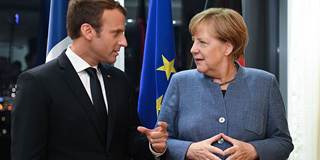Observers have been wringing their hands over Germany's recent election, in which the large mainstream parties, the CDU and the SPD, suffered significant setbacks, while the far right exceeded expectations. But the election also upended a governing coalition that had avoided desperately needed reforms for too long.
BRUSSELS – There is no doubt about it: the outcome of Germany’s recent federal election is as important as it is remarkable. The parties that have dominated German politics for years – the Social Democrats (SPD) and the Christian Democratic Union (CDU), plus its Bavarian sister party, the Christian Social Union (CSU) – all lost support at the ballot box.
The CDU/CSU and SPD’s inward-looking election campaigns were astonishingly parochial. The most widely discussed topics included a proposed diesel ban, tax policies, rental fees, and internal security issues. Yes, these are relevant matters for German voters. But when it came to the most pressing challenges confronting the European Union and the eurozone, Germany’s mainstream parties were largely silent.
Those challenges are manifold. The United Kingdom is negotiating its exit from the EU, and there is deep uncertainty as to what the future UK-EU relationship will look like. The EU desperately needs to prevent a further decline of democracy and the rule of law in Poland and Hungary. It has yet to develop a long-term solution to the migration and refugee crisis. And it must confront the security challenges stemming from terrorism, a revanchist Russia, and a rudderless America under President Donald Trump. At the same time, while the eurozone is finally showing signs of growth, its recovery still must be stabilized.

BRUSSELS – There is no doubt about it: the outcome of Germany’s recent federal election is as important as it is remarkable. The parties that have dominated German politics for years – the Social Democrats (SPD) and the Christian Democratic Union (CDU), plus its Bavarian sister party, the Christian Social Union (CSU) – all lost support at the ballot box.
The CDU/CSU and SPD’s inward-looking election campaigns were astonishingly parochial. The most widely discussed topics included a proposed diesel ban, tax policies, rental fees, and internal security issues. Yes, these are relevant matters for German voters. But when it came to the most pressing challenges confronting the European Union and the eurozone, Germany’s mainstream parties were largely silent.
Those challenges are manifold. The United Kingdom is negotiating its exit from the EU, and there is deep uncertainty as to what the future UK-EU relationship will look like. The EU desperately needs to prevent a further decline of democracy and the rule of law in Poland and Hungary. It has yet to develop a long-term solution to the migration and refugee crisis. And it must confront the security challenges stemming from terrorism, a revanchist Russia, and a rudderless America under President Donald Trump. At the same time, while the eurozone is finally showing signs of growth, its recovery still must be stabilized.